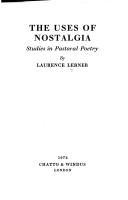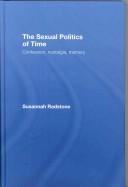| Listing 1 - 10 of 54 | << page >> |
Sort by
|
Book
ISBN: 9780748655700 0748655700 9780748655724 0748655727 9780748655717 0748655719 9780748655694 0748655697 0748684298 9780748684298 1299105718 9781299105713 Year: 2013 Publisher: Edinburgh : Edinburgh University Press,
Abstract | Keywords | Export | Availability | Bookmark
 Loading...
Loading...Choose an application
- Reference Manager
- EndNote
- RefWorks (Direct export to RefWorks)
Uncovers the politics of nostalgia and madness inherent in the Arabic novel. The Arabic novel has taken shape in the intercultural networks of exchange between East and West, past and present. Wen-chin Ouyang shows how this has created a politics of nostalgia which can be traced to discourses on aesthetics, ethics and politics that are relevant to cultural and literary transformations of the Arabic speaking world in the 19th and 20th centuries. She reveals nostalgia and madness as the tropes through which the Arabic novel writes its own history, as a story of grappling with and resisting the hegemony of both the state and cultural heritage.
Nostalgia in literature, Arabic. --- Arabic fiction --- History and criticism. --- Nostalgia in literature. --- Arabic literature
Book
ISBN: 1443892114 9781443892117 1443890251 9781443890250 Year: 2016 Publisher: Newcastle up on Tyne, UK Cambridge Scholars Publishing
Abstract | Keywords | Export | Availability | Bookmark
 Loading...
Loading...Choose an application
- Reference Manager
- EndNote
- RefWorks (Direct export to RefWorks)
This volume brings together papers that examine American literary texts and cultural phenomena as manifestations and/or expressions of nostalgia. Inspired by Svetlana Boym's seminal study The Future of Nostalgia (2001), the authors of the sixteen chapters demonstrate that this sentiment proves to be a useful key in the process, opening up new interpretive vistas and enabling new critical insights. The experience that comes under scrutiny in these texts is informed by the fundamental division into a certain "present," which is the domain of insatiability, and a certain "past" - the locus of at-
American literature --- Nostalgia in literature. --- History and criticism.
Book
ISBN: 8308031129 Year: 2001 Publisher: Kraków : Wydawnictwo literackie,
Abstract | Keywords | Export | Availability | Bookmark
 Loading...
Loading...Choose an application
- Reference Manager
- EndNote
- RefWorks (Direct export to RefWorks)
Nostalgia in literature. --- Polish prose literature --- History and criticism.
Book
ISBN: 9791037040237 Year: 2024 Publisher: Paris : Hermann,
Abstract | Keywords | Export | Availability | Bookmark
 Loading...
Loading...Choose an application
- Reference Manager
- EndNote
- RefWorks (Direct export to RefWorks)
Drama --- Nostalgia in literature --- Theater --- History and criticism --- History
Book
ISBN: 9791037016720 Year: 2024 Publisher: Paris: Hermann,
Abstract | Keywords | Export | Availability | Bookmark
 Loading...
Loading...Choose an application
- Reference Manager
- EndNote
- RefWorks (Direct export to RefWorks)
La nostalgie, passion des retours impossibles, naît de l’expérience du manque. Les lieux, temps et états hors de portée – terre natale, âge d’or, origine, vie intacte – sont les objets de cette langueur, faisant du sujet nostalgique un être doublement présent et absent, entre enracinement et errance. Ce néologisme, forgé au xviie siècle pour désigner le mal du pays, évoque aujourd’hui aussi bien une posture passéiste qu’une ressource psychique face à la mort inévitable, ou encore l’aspiration à un idéal.Faits et fantasmes à la fois, les objets hybrides de la nostalgie sont invoqués et transposés par le théâtre. Art des sens et du partage de matières, d’odeurs, de lumières et d’ombres, de sons et de silences, il sait, tout comme la madeleine de Proust, rendre présent l’inaccessible et faire émerger des sensations nostalgiques en donnant chair et relief aux « fantômes du regret » (A. Camus).Cet ouvrage réunit vingt-et-un textes sur les pratiques et les discours nostalgiques – ou anti-nostalgiques – du xviie au xxie siècle, questionnant des stratégies et des dispositifs de mise en scène, de dramaturgie, du corps en scène, de transmission des savoirs incarnés, de scénographie et d’historiographie des arts vivants.
Nostalgie --- Théâtre --- Dans la littérature. --- Histoire. --- Au théâtre --- Drama --- Nostalgia in literature --- Nostalgia in literature. --- Theater --- History. --- History and criticism --- History
Book
ISBN: 1443816477 9781443816472 1443889067 9781443889063 Year: 2016 Publisher: Newcastle upon Tyne, UK
Abstract | Keywords | Export | Availability | Bookmark
 Loading...
Loading...Choose an application
- Reference Manager
- EndNote
- RefWorks (Direct export to RefWorks)
Golden age (Mythology) --- Nostalgia in literature. --- Nostalgia in motion pictures. --- Motion pictures --- Mythology, Classical --- Paradise

ISBN: 0701118261 Year: 1972 Publisher: London : Chatto and Windus,
Abstract | Keywords | Export | Availability | Bookmark
 Loading...
Loading...Choose an application
- Reference Manager
- EndNote
- RefWorks (Direct export to RefWorks)
Country life in literature. --- Nostalgia in literature. --- Pastoral poetry --- History and criticism.

ISBN: 9780415066907 9780415066914 9780203937662 Year: 2007 Publisher: Milton Park, Abingdon, Oxon ; New York : Routledge,
Abstract | Keywords | Export | Availability | Bookmark
 Loading...
Loading...Choose an application
- Reference Manager
- EndNote
- RefWorks (Direct export to RefWorks)
Confession in literature. --- Feminist criticism. --- Feminist theory. --- Nostalgia in literature. --- Nostalgia in motion pictures.
Book
Year: 2015 Publisher: Firenze : Firenze University Press,
Abstract | Keywords | Export | Availability | Bookmark
 Loading...
Loading...Choose an application
- Reference Manager
- EndNote
- RefWorks (Direct export to RefWorks)
This book examines the feeling that we often refer to as ‘nostalgia’ from the perspective of writers and artists located on the (imperial, Soviet, and Post-Soviet) periphery of Russian culture who regard the centre of the culture from which they have been excluded with varying degrees of longing and ambivalence. The literary and artistic texts analysed here have been shaped by these author’s ruminations on social and psychological marginalization, a process that S. Boym has called ‘reflective nostalgia’ and that the authors of this volume also refer to as ‘toska’.
Russian literature --- Melancholy in literature. --- Nostalgia in literature. --- History and criticism.
Book
ISBN: 9789004526532 Year: 2022 Publisher: Boston : BRILL,
Abstract | Keywords | Export | Availability | Bookmark
 Loading...
Loading...Choose an application
- Reference Manager
- EndNote
- RefWorks (Direct export to RefWorks)
"Twilight Histories explores the relationship between nostalgia and the Victorian historical novel, arguing that both responded to the turbulence brought by accelerating modernisation. Nostalgia began as a pathological homesickness, its first victims seventeenth-century soldiers serving abroad. Only gradually did it become the sentimental memory we understand it as today. In a striking parallel to nostalgia's origin, the historical novel emerged in the tumultuous early-years of the nineteenth century, at a time when the Napoleonic Wars once again set troops on the move, creating a new wave of homesick soldiers. In the historical novels of Gaskell, Thackeray, Dickens, Eliot and Hardy, nostalgia offered a language in which to describe the experience of living through changing times as a homesickness for history"--
Nostalgia in literature. --- Homesickness in literature. --- English fiction --- History and criticism.
| Listing 1 - 10 of 54 | << page >> |
Sort by
|

 Search
Search Feedback
Feedback About UniCat
About UniCat  Help
Help News
News